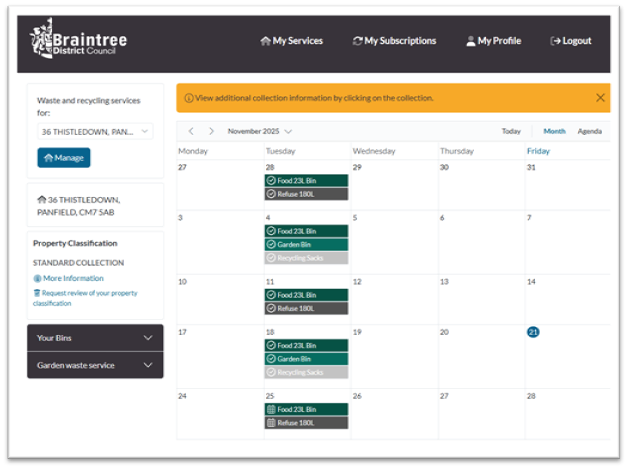In Essex, roughly 26% of waste thrown away in the general rubbish is food waste. Not only is this a waste of money but it’s also damaging the environment.
When food waste is sent to landfill, it lets off harmful greenhouse gases which contribute to climate change. However, when food waste is recycled, it is transformed into energy and fertiliser!
To find out more about a project we previously worked on in partnership with Essex County Council, visit the food recycling page on the Love Essex website.
It is important to reduce the amount of waste we all generate and to recycle or reuse whatever we can.
Most waste has a value and food waste is no exception. Food waste can produce soil fertiliser or create energy used by the National Grid, so let's not waste it.
We provide a weekly collection of food waste from houses. You can lock your food bin to keep domestic animals and wildlife away.
You can empty your food waste into a small container with a lid, like an ice cream tub or kitchen caddy. You can then transfer this into your food bin.
If you wish to wrap it first, you can use a sheet of newspaper or a compostable liner. You should not put any other non-food waste into the bin.
View more information on what can and can't go in your food bin.
Request a replacement bin
If you don't have a food bin, or if you have lost or damaged yours, you can request one online.
To complete this form, you will need to tell us:
- your name, address and contact details
- what bin you need replaced
New builds
If you are living in a newly built property and do not have bins, you can request for bins to be delivered to you by completing our request new bins form.
Assisted collections
We understand that not everyone is able to bring their waste to the collection point.
We offer help where there is a genuine need. Find out more about requesting an assisted collection.
Storing your bins
You should only put your bin out by 7am on the day of your collection.
Leaving bins or waste outside the boundary of your property between collections is a criminal offence under the Environmental Protection Act 1990.
Home composting
You can compost uncooked food waste at home. This is a great way to recycle garden and kitchen waste. You can then use the compost to keep your garden soil healthy.
You can find more information on our composting page.
Flats Food Waste Trial
We are currently working with Essex County Council to conduct trial food waste collections from a small number of flats blocks in the district.
The blocks included in the trial will have a food waste bin provided for recycling food waste. Visit the Love Essex website for more information

